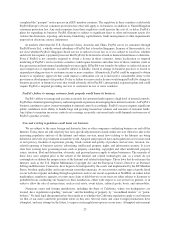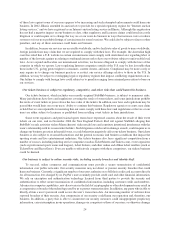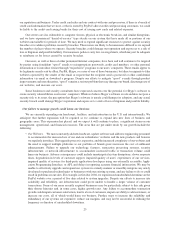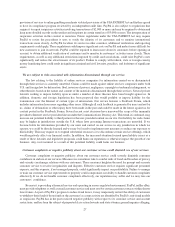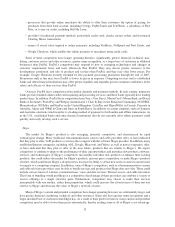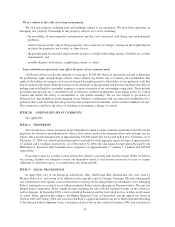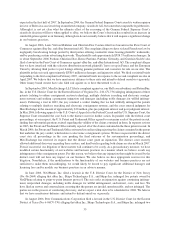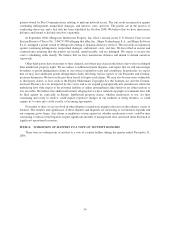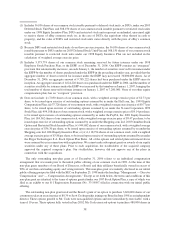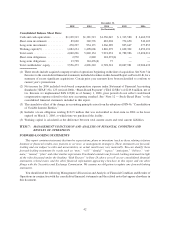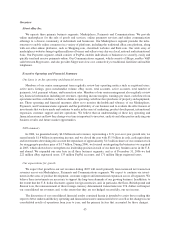eBay 2006 Annual Report Download - page 37
Download and view the complete annual report
Please find page 37 of the 2006 eBay annual report below. You can navigate through the pages in the report by either clicking on the pages listed below, or by using the keyword search tool below to find specific information within the annual report.to purchase goods. If these consumers prove to be less active than our earlier users, and we are unable to gain
efficiencies in our operating costs, including our cost of acquiring new customers, our business could be adversely
impacted.
The success of Skype depends on continued growth in its number of users, which in turn depends on wider
public acceptance of VoIP. The VoIP communications medium is still in its early stages, and it may not develop a
broad audience. Skype users may be required to purchase computer headsets, or leave a personal computer on to
communicate, and they may believe that the price advantage for VoIP is insufficient to justify the perceived
inconvenience. Potential users may also view more familiar online communication methods, such as e-mail or
instant messaging, as sufficient for their communications needs. Managers of some large private branch exchange,
or PBX, systems in businesses, universities, government agencies, and other institutions may refuse to allow the use
of Skype due to concerns over security, server usage, or for other reasons. If VoIP does not achieve wide public
acceptance, our Skype business will be adversely affected.
Our business depends on the development and maintenance of the Internet infrastructure.
The success of our services will depend largely on the development and maintenance of the Internet
infrastructure. This includes maintenance of a reliable network backbone with the necessary speed, data capacity,
and security, as well as timely development of complementary products, for providing reliable Internet access and
services. The Internet has experienced, and is likely to continue to experience, significant growth in the numbers of
users and amount of traffic. The Internet infrastructure may be unable to support such demands. In addition,
increasing numbers of users, increasing bandwidth requirements, or problems caused by “viruses,” “worms,” and
similar programs may harm the performance of the Internet. The backbone computers of the Internet have been the
targets of such programs. The Internet has experienced a variety of outages and other delays as a result of damage to
portions of its infrastructure, and it could face outages and delays in the future. These outages and delays could
reduce the level of Internet usage generally as well as the level of usage of our services.
We may be unable to protect or enforce our own intellectual property rights adequately.
We regard the protection of our trademarks, copyrights, patents, domain names, trade dress, and trade secrets
as critical to our success. We aggressively protect our intellectual property rights by relying on a combination of
trademark, copyright, patent, trade dress and trade secret laws, and through the domain name dispute resolution
system. We also rely on contractual restrictions to protect our proprietary rights in products and services. We have
entered into confidentiality and invention assignment agreements with our employees and contractors, and
confidentiality agreements with parties with whom we conduct business in order to limit access to and disclosure
of our proprietary information. These contractual arrangements and the other steps we have taken to protect our
intellectual property may not prevent misappropriation of our technology or deter independent development of
similar technologies by others. We pursue the registration of our domain names, trademarks, and service marks in
the U.S. and internationally. Effective trademark, copyright, patent, domain name, trade dress, and trade secret
protection is very expensive to maintain and may require litigation. We must protect our trademarks, patents, and
domain names in an increasing number of jurisdictions, a process that is expensive and may not be successful in
every location. For example, Skype is in the process of applying to register the Skype name as a trademark
worldwide. In the EU, Skype’s application is being opposed. If this opposition to Skype’s application were to be
successful, Skype might be forced to apply for trademark registration in each individual EU country, resulting in
increased expenditures and damage to its business if its application were rejected in individual countries. We have
licensed in the past, and expect to license in the future, certain of our proprietary rights, such as trademarks or
copyrighted material, to others. These licensees may take actions that diminish the value of our proprietary rights or
harm our reputation.
33


